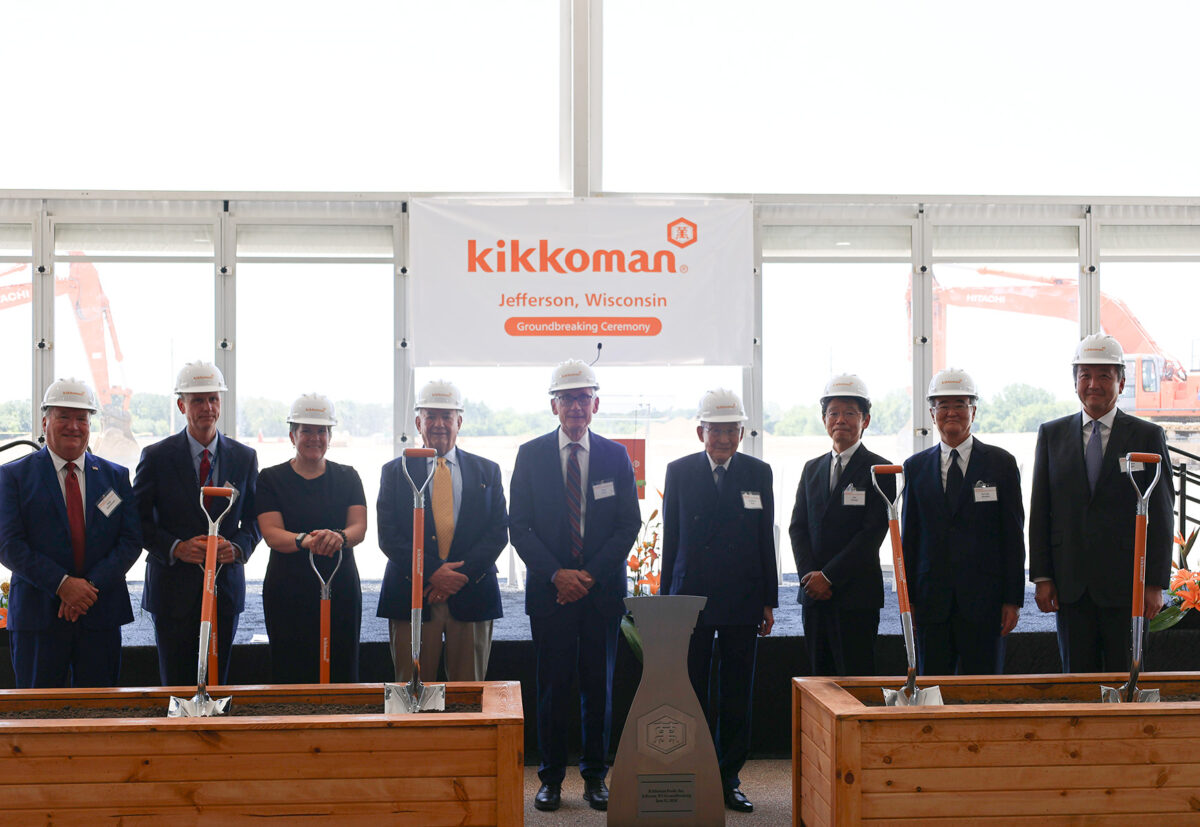
State is supporting company’s more than $800 million investment to expand business footprint in Wisconsin with up to $15.5 million in performance-based tax credits
Development efforts at new Jefferson facility and existing Walworth facility will create at least 83 new high-paying jobs over the next 12 years
JEFFERSON — Gov. Tony Evers today joined Kikkoman Chairman and honorary CEO Mr. Yuzaburo Mogi, representatives from the Kikkoman Corporation, and Wisconsin Economic Development Corporation (WEDC) Secretary and CEO Missy Hughes, as well as local elected leaders and stakeholders, for a groundbreaking ceremony for Kikkoman Foods Inc.’s (KFI) new state-of-the-art manufacturing and production facility in Jefferson. Kikkoman is investing more than $560 million to build this new facility in Jefferson, and together with an additional nearly $250 million expansion effort at the company’s existing facility in Walworth, the projects are expected to create at least 83 new high-paying jobs in Wisconsin over the next 12 years. To support this more than $800 million, large-scale development effort, WEDC will award up to $15.5 million in performance-based tax credits to assist the company in expanding its operations in Wisconsin.
“Today’s events are a watershed moment in Wisconsin’s relationship with a global brand like Kikkoman,” said Gov. Evers. “As one of the state’s largest trade partners, the strong connection between Wisconsin and Japanese businesses like Kikkoman has been instrumental in driving Wisconsin’s economic growth, bolstering innovation, and creating valuable employment opportunities for communities and families across the state. Now, we are adding Kikkoman’s new facility here in Jefferson to the growing footprint of leading Japanese businesses in Wisconsin, and I’m proud about the promise this relationship continues to hold for Wisconsinites and the future of our state.”
“Today, we are committing to an investment in the community of Jefferson and the state of Wisconsin,” said Chairman Mogi. “Kikkoman believes in Wisconsin, and we are grateful to this great state for believing in us. Our collaboration began half a century ago as a leap of faith, and today, it continues as a promise of continued growth and cultural connection.”
“For more than 50 years, Kikkoman has been committed to helping Wisconsin’s economy thrive,” said WEDC Secretary and CEO Missy Hughes. “Today, we celebrate a new chapter in that partnership. WEDC is pleased to support Kikkoman’s growth in our state and the bright future it promises for our communities.”
“Kikkoman’s decision to invest in Jefferson underscores the strength and appeal of our local food and beverage niche,” said Jefferson Mayor Dale Oppermann. “We appreciate the trust Kikkoman has placed in our community and look forward to a long, prosperous partnership.”
Kikkoman has played a vital role in Wisconsin’s economy for more than half a century. In 1973, with the opening of KFI in Walworth, the company transformed the area into what has now become the Kikkoman Group’s highest-producing soy sauce facility in the world. The plant made history as one of the first production facilities built in the United States by a Japanese company. Since then, Kikkoman has forged partnerships and friendships within the local community, celebrating shared cultural values like hard work, respect, cooperation, and a commitment to excellence, and contributing more than $17 million to charitable causes in the local community and beyond.
In 1998, Kikkoman opened a second production facility in Folsom, California. As demand for Kikkoman® Soy Sauce and other sauces and seasonings continues to grow in North America, the company spent the last several years conducting a nationwide search to identify the ideal location for a third manufacturing facility. Choosing from among 64 Midwestern locations, Kikkoman ultimately selected a 100-acre site in Jefferson as the location for its newest facility.
According to Kikkoman, the new 240,000-square-foot KFI Jefferson facility, set on a 100-acre lot at the heart of what will be the 200-acre Food and Beverage Innovation Campus, will be a model of state-of-the-art food manufacturing. The facility will produce soy sauce and soy-related seasonings with the first shipments of soy sauce planned for Fall 2026. Kikkoman noted that the plant will be fully integrated and highly automated using cutting-edge mobile technology and has been designed for flexibility, speed, efficiency, and scalability, with the ability to make smaller or larger batch sizes as needed. In keeping with Kikkoman’s commitment to sustainability and stewardship, the facility will reduce CO2 emissions by installing energy-efficient equipment, minimizing waste, and proactively using renewable energy.
Japan’s economy is now the fourth largest in the world, and the nation is a significant partner of the United States in a number of foreign policy areas. The partnership between Wisconsin and Japanese businesses has been instrumental in driving Wisconsin’s economic growth, fostering innovation, and creating valuable employment opportunities for families and communities across the state. According to WEDC, Japan is Wisconsin’s 11th largest trade partner, ranking 10th among the state’s export destinations and 11th among the state’s import sources.
In Wisconsin, investments from Japanese companies have been an advantage for the state and local economies, leading to the establishment of manufacturing facilities, research and development centers, and corporate offices. There are 81 Japanese companies with over 224 operations throughout Wisconsin, and this robust collaboration has created approximately 9,000 jobs, invigorating the state’s economy and elevating Wisconsin’s position in the global market. Since 2013, Japan has invested over $2.6 billion in Wisconsin, making it the second-largest investor in the state after Canada.
In April, Gov. Evers and First Lady Kathy Evers attended the distinguished White House State Dinner in Washington, D.C., in honor of Prime Minister Kishida Fumio and Mrs. Kishida Yuko of Japan, the first official visit by a Japanese leader since 2015. This occasion highlighted the deep-rooted economic ties and alliance between the United States and Japan. Gov. Evers’ participation in the State Dinner is a testament to Wisconsin’s key role in fostering international economic relationships and the mutual benefits derived from such partnerships.
An online version of this release is available here.
